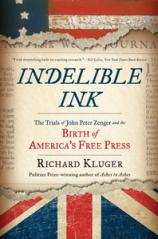Indelible Ink: The Trials of John Peter Zenger and the Birth of America's Free Press
Review
Indelible Ink: The Trials of John Peter Zenger and the Birth of America's Free Press
The more things change, the more they stay the same. Even before our nation was founded, newspaper publishers found that criticizing government officials was good for business. And many times, those critical attacks drew heated responses from those in power, resulting in political retaliation that often turned political protest into heroism. In 1733, the newly appointed colonial governor of New York, William Cosby, engaged in a political battle regarding his salary and overall governance. Cosby, with the support of his political allies, sought to manipulate the colonial courts charged with resolving the dispute. His opposition disagreed and had as an ally John Peter Zenger, publisher of the New-York Weekly Journal. The resulting battle that occurred led to Zenger’s imprisonment as he awaited trial, a trial that has become symbolic for its role in the interpretation of First Amendment freedoms in our nation.
INDELIBLE INK by Richard Kluger is the story of that case. Even today, as a national debate over the proper exercise of those freedoms is played out across America, Kluger’s exhaustive and well-written narrative of events that actually preceded the creation of the First Amendment is timely and thought-provoking.
"[A]s a national debate over the proper exercise of those freedoms is played out across America, Kluger’s exhaustive and well-written narrative of events that actually preceded the creation of the First Amendment is timely and thought-provoking."
Kluger’s narrative spans more than 300 pages, an unusually lengthy historical account for a trial that involved no testimony and only 10 minutes of jury deliberation. Zenger, an immigrant from Germany, had apprenticed as a printer and started the New-York Weekly Journal without any political agenda. He wanted to be a successful printer, not a political firebrand. While he would be imprisoned for more than eight months awaiting trial, the men responsible for the actual words of the publications who would never see the inside of a jail were two New York attorneys, Lewis Morris and James Alexander, political enemies of Cosby. As appointed governor, Cosby owed his loyalty to the King of England, while Morris and Alexander had different loyalties as well as a record of success. Twice before they had successfully used their influence to oust Cosby’s appointed predecessors.
A legal dispute regarding salary arose between Cosby and one of those predecessors. As it erupted into a formal legal battle, he manipulated the court system to ensure a victory. Morris demanded that Cosby explain a favorable decision made in that battle, and he responded by removing Morris from office.
The legal wrangling increased, and eventually Morris and Alexander sought to bring pressure against Cosby by publishing news articles attacking the Governor. Zenger agreed to publish the articles in his paper. Alexander was the author of the accusatory material, but he published under a pen name. The articles blasted Cosby as corrupt but lacked concrete evidence. One piece asserted that he was “one degree removed from an idiot.”
Cosby’s effort to stop publication of the negative articles finally resulted in Zenger’s arrest. But the name of the actual author of these pieces remained unknown. The Cosby team took the next step in the legal battle by removing and disbarring Zenger’s attorneys and appointing a young inexperienced attorney, John Chambers, as counsel. But on the day of the trial, prominent attorney Alexander Hamilton appeared for Zenger. He would speak on the publisher’s behalf, and his victory would make John Peter Zenger an iconic figure in American history.
In addition to the historical account, Kluger includes an introduction and postscript that place the Zenger case in a present-day context. These contributions remind readers that the battle for journalistic freedom continues today, centuries after Zenger placed his fate in the hands of a New York jury. INDELIBLE INK reinforces the fact that a free press, whether in printed or electronic form, remains a key ingredient of our freedom, and those continuing the struggle for that freedom are important actors and actresses in American democracy.
Reviewed by Stuart Shiffman on October 7, 2016
Indelible Ink: The Trials of John Peter Zenger and the Birth of America's Free Press
- Publication Date: October 24, 2017
- Genres: History, Nonfiction
- Paperback: 384 pages
- Publisher: W. W. Norton & Company
- ISBN-10: 0393354857
- ISBN-13: 9780393354850





